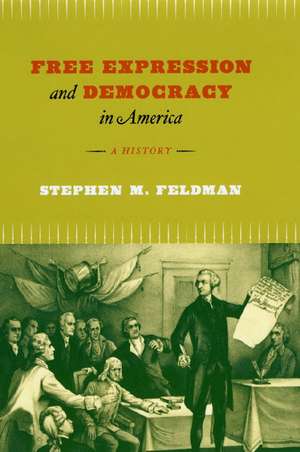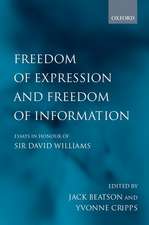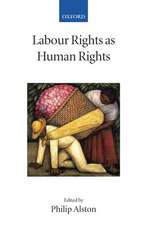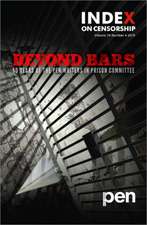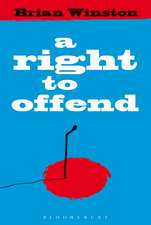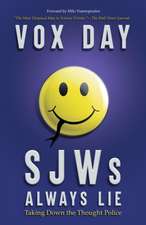Free Expression and Democracy in America: A History
Autor Stephen M. Feldmanen Limba Engleză Paperback – 14 sep 2015
From the 1798 Sedition Act to the war on terror, numerous presidents, members of Congress, Supreme Court justices, and local officials have endorsed the silencing of free expression. If the connection between democracy and the freedom of speech is such a vital one, why would so many governmental leaders seek to quiet their citizens? Free Expression and Democracy in America traces two rival traditions in American culture—suppression of speech and dissent as a form of speech—to provide an unparalleled overview of the law, history, and politics of individual rights in the United States.
Charting the course of free expression alongside the nation’s political evolution, from the birth of the Constitution to the quagmire of the Vietnam War, Stephen M. Feldman argues that our level of freedom is determined not only by the Supreme Court, but also by cultural, social, and economic forces. Along the way, he pinpoints the struggles of excluded groups—women, African Americans, and laborers—to participate in democratic government as pivotal to the development of free expression. In an age when our freedom of speech is once again at risk, this momentous book will be essential reading for legal historians, political scientists, and history buffs alike.
Preț: 359.11 lei
Nou
Puncte Express: 539
Preț estimativ în valută:
68.72€ • 71.48$ • 56.74£
68.72€ • 71.48$ • 56.74£
Carte tipărită la comandă
Livrare economică 14-28 aprilie
Preluare comenzi: 021 569.72.76
Specificații
ISBN-13: 9780226333069
ISBN-10: 022633306X
Pagini: 544
Ilustrații: black & white illustrations
Dimensiuni: 152 x 229 x 43 mm
Greutate: 0.86 kg
Ediția:1
Editura: University of Chicago Press
Colecția University of Chicago Press
ISBN-10: 022633306X
Pagini: 544
Ilustrații: black & white illustrations
Dimensiuni: 152 x 229 x 43 mm
Greutate: 0.86 kg
Ediția:1
Editura: University of Chicago Press
Colecția University of Chicago Press
Notă biografică
Stephen M. Feldman is the Jerry W. Housel/Carl F. Arnold Distinguished Professor of Law and Adjunct Professor of Political Science at the University of Wyoming. He is the author or editor of several books, including Law and Religion: A Critical Anthology.
Cuprins
Acknowledgments
1 Democracy and Free Expression
Dimensions of Free Expression
The English and Colonial Background
2 Republican Democracy from the Revolution through the Civil War
Establishing the Parameters: The Revolution to the Framing
Republican Democracy in American Society
Judicial Review under Republican Democracy
Changing Interpretations of Republican Democracy
3 Free Expression in the Early Years
The Revolutionary Period
The Framing and the Bill of Rights
4 The Sedition Act Controversy
Politics, Expression, and Republican Democracy in the 1790s
The Alien and Sedition Acts
Consequences of the Sedition Act Prosecutions
5 Free Expression in the Nineteenth Century to 1865
1 Democracy and Free Expression
Dimensions of Free Expression
The English and Colonial Background
2 Republican Democracy from the Revolution through the Civil War
Establishing the Parameters: The Revolution to the Framing
Republican Democracy in American Society
Judicial Review under Republican Democracy
Changing Interpretations of Republican Democracy
3 Free Expression in the Early Years
The Revolutionary Period
The Framing and the Bill of Rights
4 The Sedition Act Controversy
Politics, Expression, and Republican Democracy in the 1790s
The Alien and Sedition Acts
Consequences of the Sedition Act Prosecutions
5 Free Expression in the Nineteenth Century to 1865
In the Wake of the Sedition Act Controversy
The Traditions of Dissent and Suppression
Assessing the Status of Free Expression
6 Republican Democracy from Reconstruction through 1920
Exclusion
Strains on Republican Democracy
The Same, yet Different
Populism and Progressivism
Judicial Review in a Time of Stress
7 Free Expression, American Society, and the Supreme Court
Immorality, Expression, and Libertarian Theory
Protecting the Government: Libel and Contempt
Liberty and Labor
The Supreme Court and Free Expression: The Early Cases
8 Free Expression during the World War I Era
World War I and Suppression
The Supreme Court and the War
9 Transition to Pluralist Democracy
The 1920s
The Modern Intellect, the Great Depression, and the Doubting of Democracy
The New Deal and Pluralist Democracy
The World in Crisis and the Development of Pluralist Democratic Theory
Struggles to Fulfill the Promise of Pluralist Democratic Theory
10 Pluralist Democracy and Judicial Review
Crisis and Change
The Puzzle of Pluralist Democratic Judicial Review
11 Free Expression, Pluralist Democracy, and the Supreme Court
Free-Expression Doctrine and Theory after the 1937 Turn
The Politics of Free Expression
12 The Traditions of Dissent and Suppression in the Pluralist Democratic Regime
World War II
Red Scare
Vietnam War
13 Open Questions
Notes
Index
Recenzii
“Blending together a discussion of how such notions as the public good, virtue, rights, citizenship, and value relativism are rtransformed from one era to another, Feldman subtly explains how constitutional doctrine on free expression evolves both within and across eras. . . . He offers readers a useful place to begin pondering this difficult topic. Highly recommended.”
“This book is the best comprehensive overview of the law, history, and politics of free expression in America ever published. Stephen Feldman’s history is confident, sure-footed, and scrupulously accurate. His interpretations and explanations for subtle shifts and developments in the law of free expression are convincing and, quite often, thrilling. I cannot recommend it highly enough.”
“Free Expression and Democracy in America is a splendidly detailed study of free speech in the United States. It is likely to set the standard in the field for many years to come. Feldman does a masterful job integrating American democratic and jurisprudential traditions.”
“Professor Feldman details all the major free speech fights in the history of the United States from colonial days until the end of the Vietnam War. As is the case with good comprehensive histories, this book hits all the classics and suggests a number of themes that unite disparate strands of American free speech history, most notably the transition from a republican democracy to pluralist democracy.”
"Feldman is to be congratulated for his rigorous blending of judicial history, American history, and constitutional jurisprudence, all the while keeping dissent and suppression at the fore."
"A valuable addition to the literature of free speech and the most complete historical discussion of the topic."
